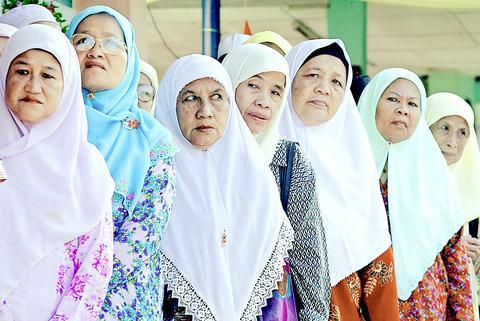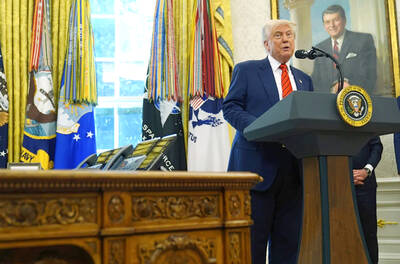Malaysia's modernist multi-religious ruling coalition headed for victory in elections yesterday, but Islamic fundamentalists predicted big gains in a struggle for the votes of the Muslim majority.
With ethnic Chinese and Indian voters holding the balance of power, Prime Minister Abdullah Ahmad Badawi's National Front expects to win big nationally but fears a slide towards the Islamists could rattle foreign investors.
The first parliamentary result, in the new administrative capital of Putrajaya south of Kuala Lumpur, went to the ruling National Front by a landslide - -- an expected outcome in a new constituency populated by civil servants.

PHOTO: AFP
Abdullah, himself an Islamic scholar, campaigned hard in the rural Muslim heartland in the north, desperate to woo voters away from the fundamentalist opposition to what he calls "modern and progressive" Islamic rule.
Malaysia was transformed over the past two decades under former premier Mahathir Mohamad from a rubber and tin exporter to one of the world's top 20 trading nations with a high-tech manufacturing base.
But the divide between the urban rich and the rural poor is sharp, with some voters making their way to the polls on foot through jungle tracks as others cruise a spaghetti of six-lane highways in the capital of Kuala Lumpur.
While the opposition Islamic Party (PAS) has promised heaven as a reward for its supporters and castigates the government as corrupt, Abdullah has offered Islamic rule which stresses science as much as religion and protects the rights of non-believers.
After voting in his home state of Penang Sunday, Abdullah predicted the National Front would reverse the losses it suffered at the hands of the Islamic hardliners in the last elections in 1999. The outlook was "very good, as good as it can be," he said.
He forecast a bigger majority in parliament than the two-thirds the front already holds and suggested the ruling party would recapture the state of Terengganu, which PAS wrested from it four years ago.
PAS leader Abdul Hadi Awang, 56, however, was confident of a further swing towards PAS nationally and predicted the party would win control of a third state.
He told reporters after voting in Marang in northwestern Terengganu, that PAS would retain the states of Terrenganu and Kelantan and take neighboring Kedah, giving it control of three out of Malaysia's 13 states.
The loss of Kedah would be a major blow to the National Front and could precipitate a rebellion against Abdullah from within his own faction-ridden party, still unnerved by Mahathir's departure.
"The mood is good," Abdul Hadi told reporters after voting. "God willing we will win two thirds majority in Terengganu. Overall we will see an increase of parliament seats. We can get Kedah."
Although Abdullah has painted the election as a contest between "progressive" Islam and backward conservatism, government corruption is also a major issue.
Acknowledging this, the prime minister has made the fight against graft and cronyism a central plank of his administration as it rides a resurgent economy and pledges development for all.
Abdullah also has on his side the fact that anger over one of the major issues in the last election -- the sacking and jailing of popular former deputy prime minister Anwar Ibrahim - -- has faded.
In the 1999 poll, the government's share of the Muslim vote slipped from 63 percent to 49 percent, with some of the support going to the new National Justice Party led by Anwar's wife Wan Azizah Wan Ismail, which took five parliamentary seats in an alliance with PAS.
The National Front remained in power, as it has since independence from Britain in 1957, partly through the support of parties representing non-Muslim minorities who fear PAS fundamentalism.
Ethnic Chinese and Indians -- Buddhists, Hindus and Christians -- make up more than a third of the population of 25 million and are expected to again ensure victory for the coalition of 14 parties.

A new online voting system aimed at boosting turnout among the Philippines’ millions of overseas workers ahead of Monday’s mid-term elections has been marked by confusion and fears of disenfranchisement. Thousands of overseas Filipino workers have already cast their ballots in the race dominated by a bitter feud between President Ferdinand Marcos Jr and his impeached vice president, Sara Duterte. While official turnout figures are not yet publicly available, data from the Philippine Commission on Elections (COMELEC) showed that at least 134,000 of the 1.22 million registered overseas voters have signed up for the new online system, which opened on April 13. However,

ALLIES: Calling Putin his ‘old friend,’ Xi said Beijing stood alongside Russia ‘in the face of the international counter-current of unilateralism and hegemonic bullying’ Chinese President Xi Jinping (習近平) yesterday was in Moscow for a state visit ahead of the Kremlin’s grand Victory Day celebrations, as Ukraine accused Russia’s army of launching air strikes just hours into a supposed truce. More than 20 foreign leaders were in Russia to attend a vast military parade today marking 80 years since the defeat of Nazi Germany in World War II, taking place three years into Russia’s offensive in Ukraine. Putin ordered troops into Ukraine in February 2022 and has marshaled the memory of Soviet victory against Nazi Germany to justify his campaign and rally society behind the offensive,

CONFLICTING REPORTS: Beijing said it was ‘not familiar with the matter’ when asked if Chinese jets were used in the conflict, after Pakistan’s foreign minister said they were The Pakistan Army yesterday said it shot down 25 Indian drones, a day after the worst violence between the nuclear-armed rivals in two decades. Pakistani Prime Minister Shehbaz Sharif vowed to retaliate after India launched deadly missile strikes on Wednesday morning, escalating days of gunfire along their border. At least 45 deaths were reported from both sides following Wednesday’s violence, including children. Pakistan’s military said in a statement yesterday that it had “so far shot down 25 Israeli-made Harop drones” at multiple location across the country. “Last night, India showed another act of aggression by sending drones to multiple locations,” Pakistan military spokesman Ahmed

US President Donald Trump on Wednesday said that he would make a decision about how the US government would refer to the body of water commonly known as the Persian Gulf when he visits Arab states next week. Trump told reporters at the White House that he expects his hosts in Saudi Arabia, Qatar and the United Arab Emirates will ask him about the US officially calling the waterway the Arabian Gulf or Gulf of Arabia. “They’re going to ask me about that when I get there, and I’ll have to make a decision,” Trump said. “I don’t want to hurt anybody’s